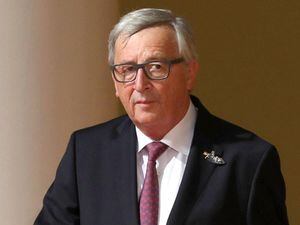EU chiefs offer assurance that Brexit backstop will not be permanent
Theresa May hailed the joint letter from Donald Tusk and Jean-Claude Juncker, but it won short shrift from critics of her plans.

The European Union does not want the controversial “backstop” arrangement to remain in place permanently following Brexit, Brussels’ most senior officials have assured Theresa May.
But European Council president Donald Tusk and European Commission president Jean-Claude Juncker stressed they were “not in a position” to rewrite or amend the Withdrawal Agreement secured by Mrs May last November.
The Prime Minister welcomed the joint letter as an assurance that MPs should not view the backstop – designed to avoid a hard border in Ireland – as “a threat or a trap”.
And Attorney General Geoffrey Cox issued advice stating that it confirmed that pledges by the remaining 27 EU leaders to work swiftly to forge a new post-Brexit relationship with the UK “would have legal force in international law”.
In a letter to Mrs May, Mr Cox acknowledged the letter did not “alter the fundamental meanings” of her deal, but said his judgment was that the November Agreement “now represents the only politically practicable and available means of securing our exit from the European Union”.
But the development received short shrift from critics of Mrs May’s deal.
DUP deputy leader Nigel Dodds said it “bolsters our concerns”, as it provided no “legally binding assurances”.
And shadow Brexit secretary Sir Keir Starmer said: “This is a long way from the significant and legally effective commitment the Prime Minister promised last month… Nothing has changed.”
In letter to Mr Tusk and Mr Juncker requesting additional assurances, Mrs May warned that the Withdrawal Agreement was “at risk” because of MPs’ concern that the backstop could leave the UK permanently tied into arrangements under which it had to follow some EU rules and was unable to leave without consent from Brussels.
She asked for “further reassurance that the fears that some hold on both sides are misplaced”.
In their response, the EU presidents stated that they regard the Withdrawal Agreement as a “fair compromise” which would limit “the negative consequences of Brexit”.
The European Union “does not wish to see the backstop enter into force”, as it would represent a “sub-optimal trading arrangement for both sides”, they said. The EU wants to ensure it would “only be in place for as long as strictly necessary”.
The Withdrawal Agreement makes clear that that backstop comes into effect only if no broader deal on future relations has been reached by the end of the Brexit transition period in December 2020 – or after a potential extension of up to two years if that is triggered.
The EU presidents stated: “Were the backstop to enter into force in whole or in part, it is intended to apply only temporarily, unless and until it is superseded by a subsequent agreement.”
Mr Tusk said that conclusions agreed by the remaining 27 member states at a European Council summit on December 13 “have a legal value” and “may commit the EU in the most solemn manner”.
At the summit, the EU27 made a “firm commitment” to work speedily to deliver a future partnership agreement by the end of 2020, so that the backstop would not be needed.
If this proved impossible, they agreed the backstop should be activated only “temporarily” and the EU would “use its best endeavours to negotiate and conclude expeditiously a subsequent agreement that would replace the backstop”.
However there was no indication in the letter that the EU was ready to contemplate a fixed deadline date for the backstop to be brought to an end, as many MPs demand.
Mr Juncker and Mr Tusk said they were ready to sign the Withdrawal Agreement as soon as the so-called “meaningful vote” is passed by the UK Parliament, allowing preparations for a future partnership to begin “immediately thereafter”.
The letter said that the Commission was “committed to providing the necessary political impetus and resources to ensure that a future relationship agreement is drawn up as quickly as possible”.
The EU would be ready to implement the future relationship deal “provisionally” even if it has not yet been ratified by all 27 remaining member state, said the letter.
And Mr Juncker said that the Commission is ready to consider “facilitative arrangements and technologies” to replace the backstop – believed to be a reference to technological solutions to keep the Irish border open, such as numberplate recognition cameras and online customs declarations.





